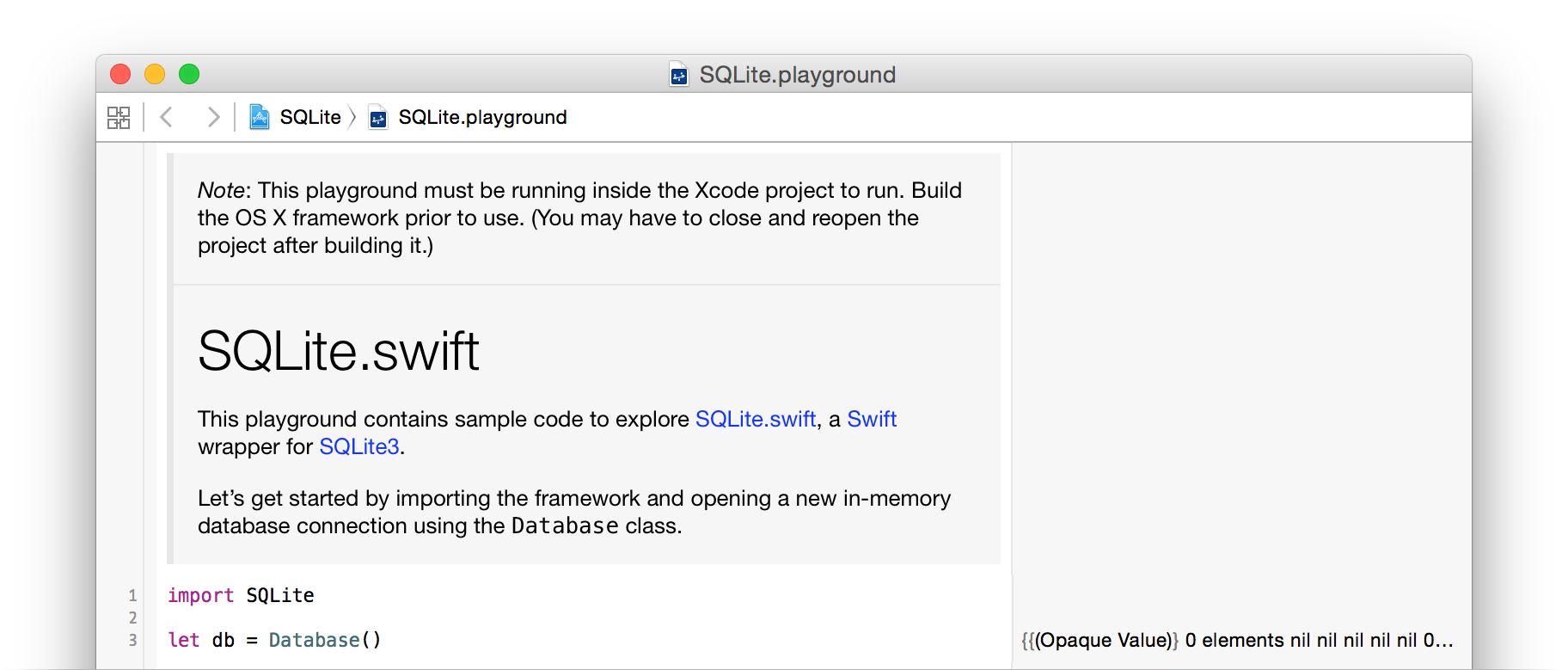At least for the functional mindset. A short one-liner should be more readable than an if-else. Signed-off-by: Stephen Celis <stephen@stephencelis.com> |
||
|---|---|---|
| Documentation | ||
| SQLite | ||
| SQLite Tests | ||
| SQLite.playground | ||
| SQLite.xcodeproj | ||
| SQLiteCipher | ||
| SQLiteCipher Tests | ||
| Vendor | ||
| sqlite3 | ||
| .gitignore | ||
| .gitmodules | ||
| CONTRIBUTING.md | ||
| LICENSE.txt | ||
| Makefile | ||
| README.md | ||
README.md
SQLite.swift
A type-safe, Swift-language layer over SQLite3.
SQLite.swift provides compile-time confidence in SQL statement syntax and intent.
Features
- A pure-Swift interface
- A type-safe, optional-aware SQL expression builder
- A flexible, chainable, lazy-executing query layer
- Automatically-typed data access
- A lightweight, uncomplicated query and parameter binding interface
- Developer-friendly error handling and debugging
- Full-text search support
- SQLCipher support
- Well-documented
- Extensively tested
Usage
import SQLite
let db = Database("path/to/db.sqlite3")
let users = db["users"]
let id = Expression<Int64>("id")
let name = Expression<String?>("name")
let email = Expression<String>("email")
db.create(table: users) { t in
t.column(id, primaryKey: true)
t.column(name)
t.column(email, unique: true)
}
// CREATE TABLE "users" (
// "id" INTEGER PRIMARY KEY NOT NULL,
// "name" TEXT,
// "email" TEXT NOT NULL UNIQUE
// )
var alice: Query?
if let rowid = users.insert(name <- "Alice", email <- "alice@mac.com").rowid {
println("inserted id: \(rowid)")
// inserted id: 1
alice = users.filter(id == rowid)
}
// INSERT INTO "users" ("name", "email") VALUES ('Alice', 'alice@mac.com')
for user in users {
println("id: \(user[id]), name: \(user[name]), email: \(user[email])")
// id: 1, name: Optional("Alice"), email: alice@mac.com
}
// SELECT * FROM "users"
alice?.update(email <- replace(email, "mac.com", "me.com"))
// UPDATE "users" SET "email" = replace("email", 'mac.com', 'me.com')
// WHERE ("id" = 1)
alice?.delete()
// DELETE FROM "users" WHERE ("id" = 1)
users.count
// SELECT count(*) FROM "users"
SQLite.swift also works as a lightweight, Swift-friendly wrapper over the C API.
let stmt = db.prepare("INSERT INTO users (email) VALUES (?)")
for email in ["betty@icloud.com", "cathy@icloud.com"] {
stmt.run(email)
}
db.totalChanges // 3
db.changes // 1
db.lastInsertRowid // 3
for row in db.prepare("SELECT id, email FROM users") {
println("id: \(row[0]), email: \(row[1])")
// id: Optional(2), email: Optional("betty@icloud.com")
// id: Optional(3), email: Optional("cathy@icloud.com")
}
db.scalar("SELECT count(*) FROM users") // 2
Read the documentation or explore more, interactively, from the Xcode project’s playground.
Installation
Note: SQLite.swift requires Swift 1.2 (and Xcode 6.3) or greater.
The following instructions apply to targets that support embedded Swift frameworks. To use SQLite.swift in iOS 7 or an OS X command line tool, please read the Frameworkless Targets section of the documentation.
To install SQLite.swift:
-
Drag the SQLite.xcodeproj file into your own project. (Submodule, clone, or download the project first.)
-
In your target’s Build Phases, add SQLite to the Target Dependencies build phase.
-
Add SQLite.framework to the Link Binary With Libraries build phase.
-
Add SQLite.framework to a Copy Files build phase with a Frameworks destination. (Add a new build phase if need be.)
SQLCipher
To install SQLite.swift with SQLCipher support:
-
Make sure the sqlcipher working copy is checked out in Xcode. If sqlcipher.xcodeproj is unavailable (i.e., it appears red), go to the Source Control menu and select Check Out sqlcipher… from the sqlcipher menu item.
-
Follow the instructions above with the SQLiteCipher target, instead.
Note: By default, SQLCipher compiles without support for full-text search. If you intend to use FTS4, make sure you add the following to Other C Flags in the Build Settings of the sqlcipher target (in the sqlcipher.xcodeproj project):
-DSQLITE_ENABLE_FTS4-DSQLITE_ENABLE_FTS3_PARENTHESIS
Communication
Read the contributing guidelines. The TL;DR (but please; R):
- Need help or have a general question? Ask on Stack
Overflow (tag
sqlite.swift). - Found a bug or have a feature request? Open an issue.
- Want to contribute? Submit a pull request.
Author
License
SQLite.swift is available under the MIT license. See the LICENSE file for more information.
Alternatives
Looking for something else? Try another Swift wrapper (or FMDB):

